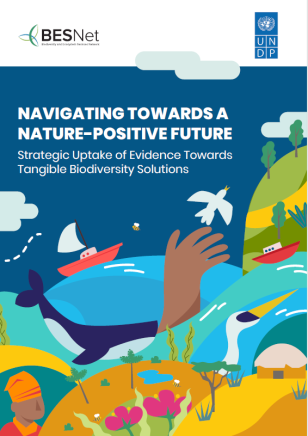Navigating Towards a Nature-Positive Future: Strategic Uptake of Evidence Towards Tangible Biodiversity Solutions

Navigating Towards a Nature-Positive Future: Strategic Uptake of Evidence Towards Tangible Biodiversity Solutions
May 22, 2024
The Biodiversity and Ecosystem Services Network (BES-Net) is a collaborative initiative dedicated to synthesizing and translating available knowledge on biodiversity into actionable measures for sustainable ecosystem management. Aligned with the Kunming-Montreal Global Biodiversity Framework (GBF) and its 2050 Vision and 2030 Mission, BES-Net supports countries in applying evidence generated by the Intergovernmental Science-Policy Platform on Biodiversity and Ecosystem Services (IPBES) and national ecosystem assessments (NEAs).
This report outlines the progress of the knowledge uptake efforts in eight countries: Cameroon, Colombia, Ethiopia, Kazakhstan, Kenya, Nigeria, Trinidad and Tobago, and Viet Nam. By fostering science-policy-practice synergies, these countries have achieved significant advances in policy alignment, governance strengthening, multistakeholder collaboration, ecosystem restoration, sustainable resource management, and community livelihood enhancement.
The metaphor of a transformative boat journey, guided by GBF, illustrates BES-Net’s support of the countries’ collective efforts toward a nature-positive future. Using insights from IPBES assessments and NEAs, each country ensures informed decision-making and collaborative action.
Country snapshots highlight notable achievements: Cameroon’s enhanced policy-science interface and renewed commitment to fill in critical data gaps identified through NEA, Colombia’s integration of assessment findings into its National Development Plan, and Ethiopia’s focus on stakeholder engagement and biodiversity platform strengthening. Kazakhstan addresses the Aral Sea's environmental challenges, showcasing sustainable agriculture's role in ecosystem restoration. Kenya emphasizes Indigenous knowledge and youth engagement in pollinator conservation, while Nigeria develops strategies for pollinator conservation and integrated pest management. Trinidad and Tobago mobilizes citizen scientists to protect pollinators, and Viet Nam addresses gaps in ecosystem services policies, focusing on marine and wetland services.
These efforts, along with others detailed in the report, showcase the potential of the BES-Net initiative in driving policy shifts and creating impactful change.

 Locations
Locations